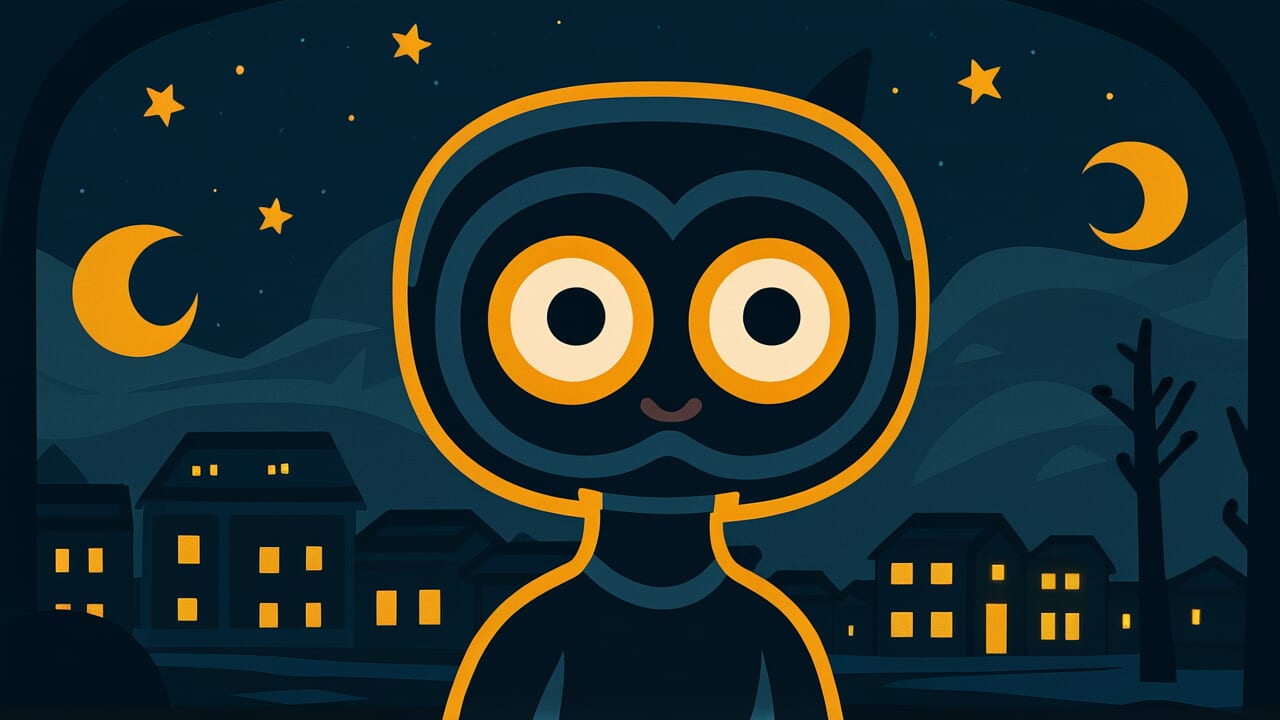How to Read “Eyes exist in the dark night”
Yamiyo ni me ari
Meaning of “Eyes exist in the dark night”
“Eyes exist in the dark night” means that secret actions are always seen by someone. No matter how much you hide in the darkness, thinking no one will notice, someone is actually witnessing what you do. This proverb serves as a warning.
This saying is used to caution people against wrongdoing and dishonesty. It challenges the naive thought that “it’s okay if I do it secretly.” The proverb teaches the importance of living honestly in any situation.
It also works as a reminder to control yourself before taking actions you want to keep secret.
In modern society, this proverb has become more relatable with surveillance cameras and social media. In the digital age, “eyes” literally exist everywhere. The lesson that secrets will always be exposed has never felt more real.
Origin and Etymology
The exact origin of this proverb in historical texts hasn’t been identified. However, we can make interesting observations from how the phrase is constructed.
“Eyes exist in the dark night” is often mentioned alongside its counterpart, “walls have ears.” Both carry the same warning message.
A dark night means a pitch-black night without even moonlight. In times before modern street lighting, a dark night meant complete darkness. The paradox that eyes exist even in such conditions where no one should see you is the core of this proverb.
This saying likely held special meaning in Edo period townspeople’s culture. In crowded row house living, the concept of privacy barely existed. People’s actions were constantly exposed to someone’s gaze.
Even if you tried to do something under the cover of night’s darkness, someone would always see. This lived experience probably gave birth to this expression.
The Buddhist concept of “cause and effect” also likely influenced this proverb’s background. The religious warning that even if you escape human eyes, you cannot escape heaven’s eyes or Buddha’s eyes probably became established as a more concrete everyday expression.
Usage Examples
- Even if you think no one’s watching and commit fraud, eyes exist in the dark night, so you’ll definitely get caught
- I was going to secretly dispose of it late at night, but I’ll stop because eyes exist in the dark night
Universal Wisdom
“Eyes exist in the dark night” has been passed down through generations because it touches on fundamental human psychology. It recognizes that everyone has the weakness of “acting differently when not being watched.”
Human morality is actually greatly supported by external observation. The awareness that someone is watching becomes a powerful force that controls our behavior.
Conversely, the moment we think no one is watching, we become weak to temptation. Our ancestors understood this human nature. They tried to maintain people’s ethics by making them conscious that “they are actually being watched.”
What’s interesting is that this proverb isn’t just a threat. It’s wisdom based on experience. Secrets do leak out. Even when you think you can hide something perfectly, it gets exposed from unexpected places.
This happens because there might be accidental witnesses, small pieces of evidence remain, or you unconsciously reveal it yourself.
This proverb was teaching the importance of “transparency” in human society hundreds of years ago. It conveys the universal truth that a life without secrets ultimately leads to the safest and most peaceful existence.
When AI Hears This
From an information theory perspective, this proverb captures the essence that “information replication cost is near zero.” The moment you do something in the dark night, that information is recorded in at least one observer’s brain.
Then that information is no longer under your sole control. In information theory, the entropy of observed information is preserved, and erasure always requires cost. In other words, you cannot make it “unhappen.”
Even more interesting is the connection to “the strength of weak ties” in network theory. Even people who don’t know you directly can receive information through two or three intermediaries.
Stanford University research shows that in human society, you can connect with anyone through an average of six people. Even if the witness in the dark night is a stranger, that information has a high probability of reaching relevant parties through unexpected routes.
Modern social media has accelerated this principle to the extreme. Even if you press the delete button on a post, the information remains if someone took a screenshot.
Blockchain technology works on the same principle. If a record remains anywhere in a decentralized network, that information is virtually impossible to erase. People in the Edo period intuitively understood this irreversibility of information spread without digital technology.
Lessons for Today
What this proverb teaches us living in modern times is the importance of abandoning the very idea that “it’s okay because no one’s watching.” Being able to act the same way whether someone is watching or not. Isn’t that true integrity?
In the age of social media, we’re constantly aware of “the self we show.” But what’s truly important is whether you can be authentic and honest in the parts you don’t show anyone.
“Eyes exist in the dark night” isn’t telling you to fear external surveillance. Rather, it’s teaching you to have your own inner eye.
Cutting corners or breaking rules just because no one is watching is ultimately a betrayal of yourself. A person’s true worth appears in their actions when no one is watching.
Ask yourself in the moments when you think no one is watching: “Is this an action I can proudly talk about?” Choosing a way of life where you can honestly answer that question.
That is the greatest gift this proverb offers to modern people.



Comments